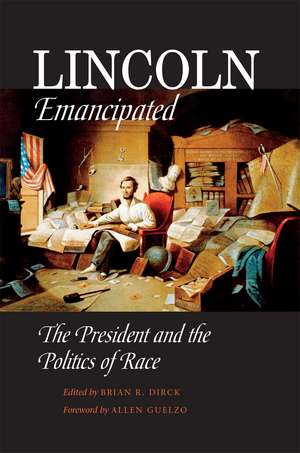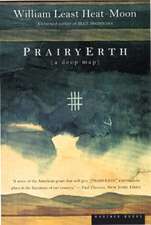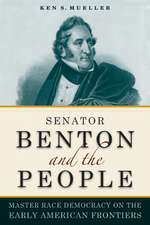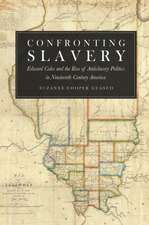Lincoln Emancipated: The President and the Politics of Race
Editat de Brian R. Dircken Limba Engleză Hardback – 18 ian 2007
Abraham Lincoln has long been revered by blacks and whites alike as the “Great Emancipator.” In recent years, however, this image has come under assault by scholars who question Lincoln’s commitment to racial equality and who assert that he was in fact, as Frederick Douglass once noted, the “white man’s president.” Such arguments challenging deep-seated assumptions about our nation’s beloved leader demand serious investigation.
What personal beliefs did Lincoln hold about the inherent differences or similarities between blacks and whites? How did his vision for race relations change as a result of the Civil War? What political, legal, and cultural circumstances prompted him to issue the Emancipation Proclamation? And in what ways have Americans chosen to remember Lincoln’s legacy? Does he truly deserve his fame as the “Great Emancipator?”
In this volume, seven historians attempt to answer these critical questions. Kenneth J. Winkle analyzes the racial climate of the early nineteenth-century Midwest in order to place Lincoln’s views in context. Kevin R. C. Gutzman discusses the influence of Thomas Jefferson’s racial politics upon Lincoln; and James N. Leiker scrutinizes Lincoln’s attitudes toward Native Americans, Asians, and Hispanics as well as toward blacks. Phillip S. Paludan and Brian Dirck describe Lincoln’s tortured deliberation over emancipation, while Dennis K. Boman uses Missouri as a case study of the president’s delicate handling of this explosive issue. By tracing the changes in Lincoln’s proposals for the future of liberated slaves, Michael Vorenberg argues that, despite what many Americans today would consider limitations, Lincoln demonstrated a remarkable open-mindedness and capacity for growth.
Allen C. Guelzo opens the volume with a thought-provoking foreword.
What personal beliefs did Lincoln hold about the inherent differences or similarities between blacks and whites? How did his vision for race relations change as a result of the Civil War? What political, legal, and cultural circumstances prompted him to issue the Emancipation Proclamation? And in what ways have Americans chosen to remember Lincoln’s legacy? Does he truly deserve his fame as the “Great Emancipator?”
In this volume, seven historians attempt to answer these critical questions. Kenneth J. Winkle analyzes the racial climate of the early nineteenth-century Midwest in order to place Lincoln’s views in context. Kevin R. C. Gutzman discusses the influence of Thomas Jefferson’s racial politics upon Lincoln; and James N. Leiker scrutinizes Lincoln’s attitudes toward Native Americans, Asians, and Hispanics as well as toward blacks. Phillip S. Paludan and Brian Dirck describe Lincoln’s tortured deliberation over emancipation, while Dennis K. Boman uses Missouri as a case study of the president’s delicate handling of this explosive issue. By tracing the changes in Lincoln’s proposals for the future of liberated slaves, Michael Vorenberg argues that, despite what many Americans today would consider limitations, Lincoln demonstrated a remarkable open-mindedness and capacity for growth.
Allen C. Guelzo opens the volume with a thought-provoking foreword.
Preț: 180.63 lei
Nou
Puncte Express: 271
Preț estimativ în valută:
34.57€ • 37.57$ • 29.06£
34.57€ • 37.57$ • 29.06£
Carte disponibilă
Livrare economică 31 martie-14 aprilie
Preluare comenzi: 021 569.72.76
Specificații
ISBN-13: 9780875803593
ISBN-10: 0875803598
Pagini: 203
Dimensiuni: 140 x 216 x 20 mm
Greutate: 0.39 kg
Ediția:1
Editura: Northern Illinois University Press
Colecția Northern Illinois University Press
ISBN-10: 0875803598
Pagini: 203
Dimensiuni: 140 x 216 x 20 mm
Greutate: 0.39 kg
Ediția:1
Editura: Northern Illinois University Press
Colecția Northern Illinois University Press
Recenzii
“Lincoln Emancipated points the way toward a new understanding of Lincoln that absorbs the most valid points of each side and rejects their emotionally or politically motivated exaggerations.”—Gerald Prokopowicz, East Carolina University
“This collection is unique in its sustained discussion of Lincoln’s racial views and emancipation policy.”—Thomas Schwartz, Abraham Lincoln Presidential Library and Museum
"A thoughtful study that seeks to delve behind the propaganda and into the heart of a noble albeit imperfect (and therefore utterly human) President."—The Midwest Book Review
“This collection is unique in its sustained discussion of Lincoln’s racial views and emancipation policy.”—Thomas Schwartz, Abraham Lincoln Presidential Library and Museum
"A thoughtful study that seeks to delve behind the propaganda and into the heart of a noble albeit imperfect (and therefore utterly human) President."—The Midwest Book Review
Notă biografică
Brian R. Dirck is Assistant Professor of History and Political Science at Anderson University and is the author of two other books about Lincoln.
Cuprins
Table of Contents
Foreword—Was Lincoln a Racist?—Allen C. Guelzo
Introduction—Brian R. Dirck
1 “Paradox Though It May Seem”: Lincoln on Antislavery, Race, and Union, 1837–1860—Kenneth J. Winkle
2 Greeley, Colonization, and a “Deputation of Negroes”: Three Considerations on Lincoln and Race—Phillip S. Paludan
3 Abraham Lincoln, Jeffersonian: The Colonization Chimera—Kevin R. C. Gutzman
4 The Difficulties of Understanding Abe: Lincoln’s Reconciliation of Racial Inequality and Natural Rights—James N. Leiker
5 Abraham Lincoln, Emancipation, and the Supreme Court—Brian R. Dirck
6 Slavery Reparations in Theory and Practice: Lincoln’s Approach—Michael Vorenberg
7 All Politics Are Local: Emancipation in Missouri—Dennis K. Boman
Notes
List of Contributors
Index
Introduction—Brian R. Dirck
1 “Paradox Though It May Seem”: Lincoln on Antislavery, Race, and Union, 1837–1860—Kenneth J. Winkle
2 Greeley, Colonization, and a “Deputation of Negroes”: Three Considerations on Lincoln and Race—Phillip S. Paludan
3 Abraham Lincoln, Jeffersonian: The Colonization Chimera—Kevin R. C. Gutzman
4 The Difficulties of Understanding Abe: Lincoln’s Reconciliation of Racial Inequality and Natural Rights—James N. Leiker
5 Abraham Lincoln, Emancipation, and the Supreme Court—Brian R. Dirck
6 Slavery Reparations in Theory and Practice: Lincoln’s Approach—Michael Vorenberg
7 All Politics Are Local: Emancipation in Missouri—Dennis K. Boman
Notes
List of Contributors
Index
Descriere
Abraham Lincoln has long been revered by blacks and whites alike as the “Great Emancipator.” In recent years, however, this image has come under assault by scholars who question Lincoln’s commitment to racial equality and who assert that he was in fact, as Frederick Douglass once noted, the “white man’s president.” Such arguments challenging deep-seated assumptions about our nation’s beloved leader demand serious investigation.
What personal beliefs did Lincoln hold about the inherent differences or similarities between blacks and whites? How did his vision for race relations change as a result of the Civil War? What political, legal, and cultural circumstances prompted him to issue the Emancipation Proclamation? And in what ways have Americans chosen to remember Lincoln’s legacy? Does he truly deserve his fame as the “Great Emancipator?”
In this volume, seven historians attempt to answer these critical questions. Kenneth J. Winkle analyzes the racial climate of the early nineteenth-century Midwest in order to place Lincoln’s views in context. Kevin R. C. Gutzman discusses the influence of Thomas Jefferson’s racial politics upon Lincoln; and James N. Leiker scrutinizes Lincoln’s attitudes toward Native Americans, Asians, and Hispanics as well as toward blacks. Phillip S. Paludan and Brian Dirck describe Lincoln’s tortured deliberation over emancipation, while Dennis K. Boman uses Missouri as a case study of the president’s delicate handling of this explosive issue. By tracing the changes in Lincoln’s proposals for the future of liberated slaves, Michael Vorenberg argues that, despite what many Americans today would consider limitations, Lincoln demonstrated a remarkable open-mindedness and capacity for growth.
Allen C. Guelzo opens the volume with a thought-provoking foreword.
What personal beliefs did Lincoln hold about the inherent differences or similarities between blacks and whites? How did his vision for race relations change as a result of the Civil War? What political, legal, and cultural circumstances prompted him to issue the Emancipation Proclamation? And in what ways have Americans chosen to remember Lincoln’s legacy? Does he truly deserve his fame as the “Great Emancipator?”
In this volume, seven historians attempt to answer these critical questions. Kenneth J. Winkle analyzes the racial climate of the early nineteenth-century Midwest in order to place Lincoln’s views in context. Kevin R. C. Gutzman discusses the influence of Thomas Jefferson’s racial politics upon Lincoln; and James N. Leiker scrutinizes Lincoln’s attitudes toward Native Americans, Asians, and Hispanics as well as toward blacks. Phillip S. Paludan and Brian Dirck describe Lincoln’s tortured deliberation over emancipation, while Dennis K. Boman uses Missouri as a case study of the president’s delicate handling of this explosive issue. By tracing the changes in Lincoln’s proposals for the future of liberated slaves, Michael Vorenberg argues that, despite what many Americans today would consider limitations, Lincoln demonstrated a remarkable open-mindedness and capacity for growth.
Allen C. Guelzo opens the volume with a thought-provoking foreword.












